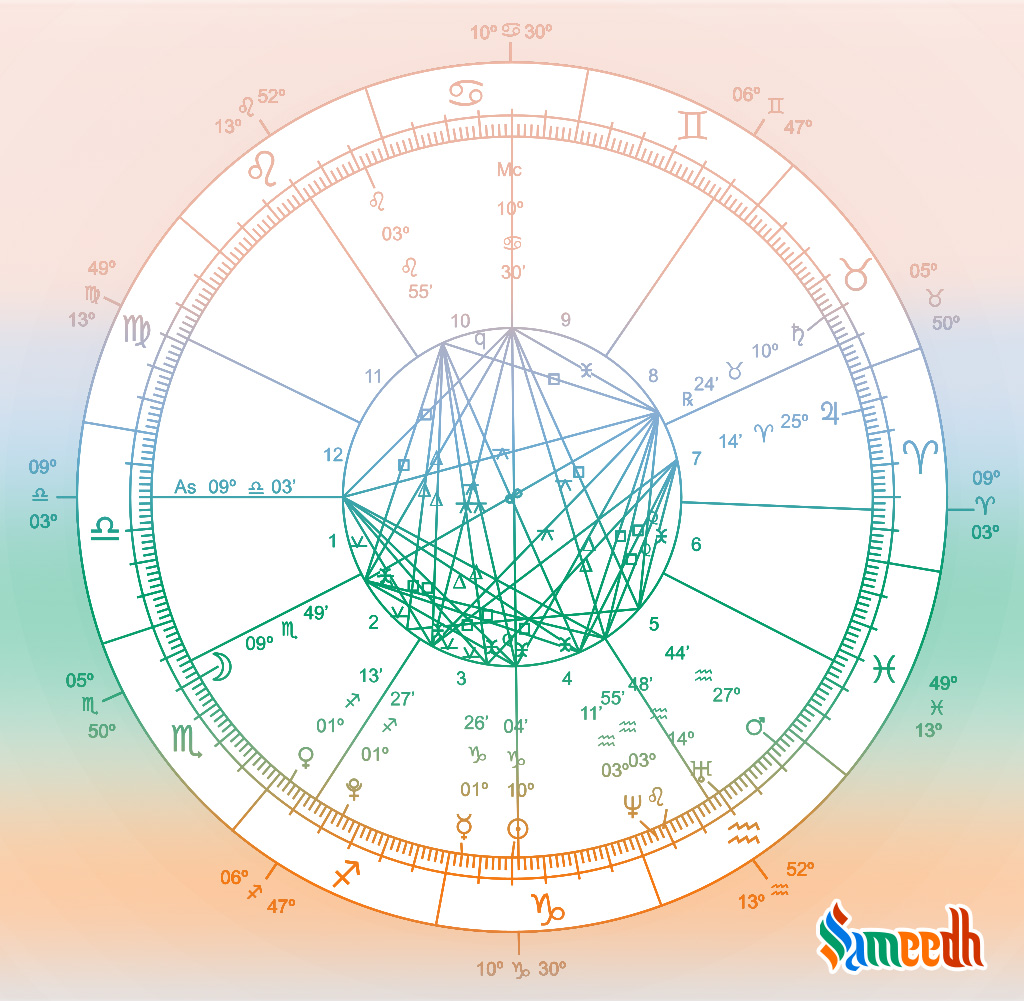A science of predicting future course of actions, Jyotish is a fascinating Indian practice that has its roots in the Vedas. This blog post elucidates interesting details. Read on to know more.

An astrological chart ; Image Source: Fred the Oyster
Jyotish, one of the six Vedangas, is the Vedic science of astronomy and astrology. The term “Jyotisha” is derived from the Sanskrit word “Jyoti,” meaning “light” or “heavenly body,” and refers to the study of celestial objects and their influence on earthly events. As a Vedanga, Jyotisha plays a crucial role in determining the proper timing (muhurta) for Vedic rituals, ceremonies, and other important activities.
Jyotish is a traditional Indian system deep rooted in the Vedic culture, that is practised by Jyotishis, or astrologers. It has deep links with Indian culture, and has till date not lost its relevance to the present time and the present generation of people. It is used to predict the outcomes of our destiny. Results can talk about what will happen in the near future or be long term predictions. This is the study of the consequences of our past actions.
ORIGIN
The first ever record of the practice of Jyotish is present in the Vedas. It has been referred as the eye of knowledge – past, present and future knowledge, as it provides proof in favour of ideas such as presence of a soul, rebirth and karmic justice. It is one of the six disciplines that support Vedic rituals. It initially began as a preparation for calendars, to mark which days, periods of time would be optimum for various pujas and events.
ETYMOLOGY
The word Jyotish, in Sanskrit, means ‘The Science Of Light.’ It is considered to be a branch of science by Vedic Scholars, hence the name, but this remains disputed to date due to there being no tangible proof or mathematical data of its methods, practices and results.
SIGNIFICANCE
There are six limbs of Jyotish –
- Gol – which refers to observational astronomy
- Ganith – which refers to calculation of planetary motions
- Jatak or Kundali – which refers to planetary position at the time of birth
- Prashn – which refers to answers of specific questions
- Muhurt – wich refers to election of the most auspicious time
- Nimitt – which refers to omens or signs
Each limb of astrology holds its own significance, and they are all studied hand in hand. They help break the façade of coincidence, helping you find meaning in every occurrence of your life.
HISTORICAL PRACTICE
Jyotish has been mentioned in more than one religious texts – for instance, it’s mentions in the Mahabharat are given as an old astrological tradition, from which we can infer that Jyotish has been present from before time itself. Religious and ritualistic practices followed in the Vedic period followed certain dates and periods, known as tithis, to be in line with the astrological significances of their event and the day.
PRESENT DAY USE
Astrology remains important to many people even today, as it provides them solace in finding meaning in places where no tangible meaning exists. Even today, in Hinduism, new born children are named according to their astrological charts. Important days as decided by astrologers are still strictly followed in context of religious rituals, or major life milestones and events such as marriages, new jobs, new homes etc.
To know more about such interesting topics related to our diverse Indian culture, and to learn more about this nation that you live in, log onto Sameedh and read more blogposts.